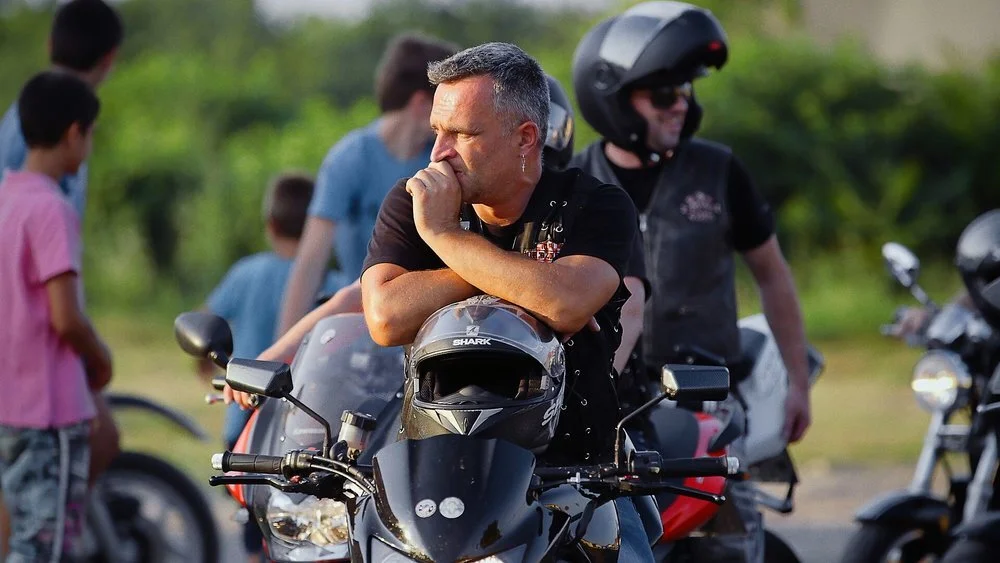Among Wolves (2016)

War in Peace
In the closing scene of Among Wolves, a former paramilitary commander in the Bosnian War named Lija talks about a gang of horses who, when faced by an approaching pack of wolves, closed ranks and formed a circle, from which they desperately hind-kicked their attackers. A quarter-century after the conflict, Lija heads a biker gang called The Wolves who, in a cosmic twist, has made a name for itself in the region, both as protectors of endangered wild horses and keepers of the national spirit in their hometown of Livno.
“It’s a fight for survival,” he says. “It is a great thing to see”.
Shawn Convey’s documentary is full of seemingly irreconcilable contrasts like this, ones that point out the madness of war as well as the natural inevitability of conflict between and among species. The Wolves look like hardened rebel bikers. Indeed, the senior membership have been physically and spiritually re-shaped by atrocities that should forgive passersby for judging these tattered books by their covers. But they have also, to a person, learned the correct lesson of combat: though sometimes necessary, it is never a cause for admiration or celebration. There is nobility in defending one’s homeland, especially in the face of overwhelming odds, but the cost of watching one’s friends disintegrate and one’s lands be pock-marked by bombs, littered with shells, and haunted by unexploded mines is nearly incalculable.
There’s a second layer to the metaphor of the horses and the wolves (or, I guess, the Wolves), and it involves the bikers’ internal generational conflict. During one of the gang’s meetings, which takes place in a crowded conference room where Lija shouts out the agenda from behind a desktop computer, one of the twenty-something Wolves is reprimanded for disrupting a nearby town with his obnoxious stunt-riding. This behavior goes against the pack’s code of conduct, which allows for all kinds of wild revelry during Wolf-approved functions, but prohibits any activities that would cause the peaceful communities around Livno to think badly of the group.
The biker in question admits to wrongdoing, and jokes his way down the humility ladder from Indignant to Subservient. Lija understands the impulses that drive the younger Wolves, most of whom weren’t even alive during the war. The elders take it upon themselves to coach the up-and-comers, not by drilling in horror stories of their days on the front lines, but by showing them the value of community outreach—by putting them through the rigors of donating blood; performing maintenance on a nearby school/orphanage; helping to deliver and unload nearly a million Euros worth of medical supplies to a hospital; and checking on those horses.
In the last thirty-plus years, Livno has all but wasted away. The replacement population is largely uninterested in sticking around, and the Wolves have formed a circle around their city, fiercely kicking at the after-effects of modernity. At one point, Lija laments, “Food prices go up. Phone prices go down”. The world of Livno and the world at large, it feels to him and his brothers, has either forgotten their sacrifices or was never forced to understand them in the first place—a direct result of the Wolves’ having taken a stand to ensure a future for their people in which they’d have the freedom to bury the past.
Part of the younger Wolves’ education involves a visit to an abandoned military base. To them, it’s a field trip, just like their appearance at a memorial dedication, which comes at the very end of the film. But to Lija and the elder Wolves, running their hands along a tank barrel and listening to the story of how one mass grave became a call to Never Forget, the tangible reminders of their still-fresh horrors are opportunities to make tangible the new fight, the good fight to keep their beloved people from making the same mistakes that turned them into killers and victims.
I don’t know anything about the Bosnian War beyond a line from Kevin Smith’s Clerks, a Wikipedia entry that made my brain hurt by paragraph two, and Shawn Convey’s documentary. Among Wolves doesn’t expound on the conflict, doesn’t offer the audience insight into whose side they should be on, who the sides even were, or what they were fighting about. The immersion made me feel stupid, frankly, but by the end I understood that Convey’s documentary isn’t about the Bosnian War. It’s about war, period. No matter the region, race, or reason of the parties involved, it’s good for absolutely nothing—except, perhaps, as a reminder that sometimes people who survive the worst are capable of doing the best.




